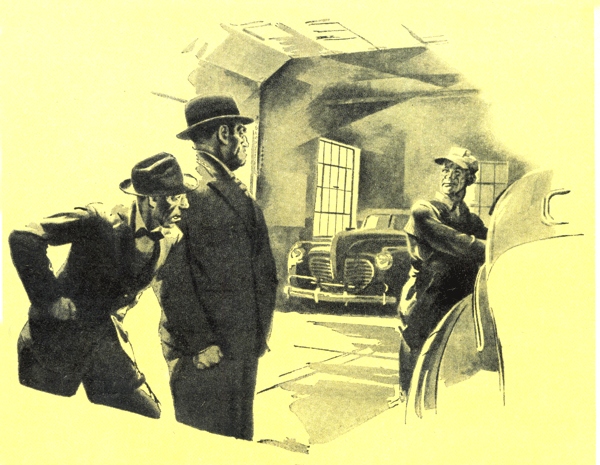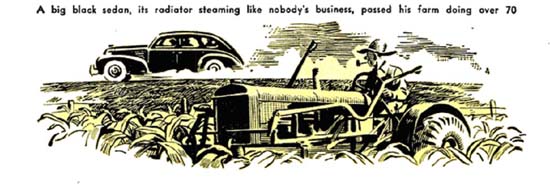May 1945
GUS
SOLVES A ROB-AND-RUN CASE
by Martin Bunn

Joe Clark hurried into the Model Garage shop. "There's a man in the office who wants his motor tuned up in a hurry," he told his partner Gus Wilson. "Can you handle it for him today?"
"Not a chance," Gus said flatly.
"This fellow looks like big money," Joe persisted. "His name's Jonas I. Whittman. He's from Boston, and he's staying down at the Park House while he's looking over some manufacturing plant he's thinking of buying. We've got to think of after the war, Gus, and he might turn into a good customer if we did him a favor now."
Gus grunted and waved a grease-blackened hand at the cars that crowded the shop floor. "Every one of these jobs belongs to someone who's a good customer now," he observed. "And every one of them needs something a lot more vital than a tune-up to keep rolling. You're a salesman, Joe. Sell your new friend the idea of waiting his turn the same as everybody else these days. Let's see now," He scratched his ear as he thought over the various jobs. "Wednesday's the best I can do," he decided. "Tell him if he has his car in here by noon I'll have it ready at five."
Just before noon on Wednesday, Stan, the grease monkey, came into the shop and said: "Party by the name of Whittman just left a bus outside."
"Drive it in," Gus directed. Stan did. Gus's eyes told him that it was an expensive five-year-old car that hadn't had good care. His ears told him that there wasn't anything seriously wrong with its straight-eight engine, but that it had been driven hard and probably far since its last overhaul.
He checked the engine, and then started to give it a good going over. When he got to the air cleaner he found it clogged with an unusual amount of sand. He spilled a little into his palm and robbed the grains with a forefinger. In a wink he was 2,000 miles away from the Model Garage. Through the heat shimmer he could see far-off mountains gray-green with greenwood and purple with sagebrush. The sun was scorching the back of his neck; the hot, thin air of the high desert was in his nostrils . . .
Gus shook his head and laughed. "Doesn't a man ever get old enough for his feet to stop itching?" he asked himself.
Shortly before five o'clock two men came into the shop. One of them was stout and heavy-cheeked and had a manner in which authority was tempered by geniality. His companion had shifty eyes that looked like pale agates set close in a putty-colored face.
"I'm Mr. Whittman," boomed the heavy man. "My car ready?"
"All ready," Gus told him.
"Fine," Whittman said. "Much the matter with it?"
"Engine needed tuning," Gus said, "and your oil was dirty. I drained and flushed out the crankcase and refilled it."
"Fine," Whittman repeated. "Got to have the old car in good shape -- I keep Blackie here busy driving me around these days, don't I, Blackie?" The man with the pale eyes nodded silently. "I'm from Boston," Wittman went on expensively, "looking over some small manufacturing plants with the idea of buying one of 'em."
"You've been in the Southwest recently --" Gus started pleasantly.
The pale-eyed man jumped backward as if he had stepped on a rattlesnake, and Gus saw his right hand glide into his coat pocket. Whittman glared at Gus. "What's that about the Southwest?" he rasped.
Gus laughed, "When I took off your air cleaner," he explained, "I found it pretty well loaded with sand."
"You're quite a detective, aren't you?" Whittman said poisonously. "But you figured wrong this time. I've never been west of Chicago, and neither has this car."
He laughed suddenly, and all his geniality came flooding back. "That sand -- now where could it have come from? Why, of course! Last month I was visiting my brother in New Hampshire -- he's in the sand and gravel business. While his car was in the shop I let him use mine to get around to his plants. That's where it picked up the sand. Well, my friend, how much do I owe you?"
He paid his bill, forced an expensive cigar on Gus, and the silent Blackie drove him away. Gus shrugged. "It's none of my business," he told himself, "but no car in the East ever collects that much sand in the filter, and besides in the sand and gravel business they use a coarse sand."
Trooper Jerry Corcoran, jaunty as usual, sat on Gus's workbench and lighted a cigarette. "Had any radiator jobs lately?" he asked. "Not for folks you know -- a stranger with a leaky radiator?"
"The last one was months ago," Gus told him. "Why?"
"Read about that bank robbery up in Valleyfield yesterday?" Jerry inquired.
"I saw the morning paper," Gus said, "but Valleyfield is 70 miles upstate, so I didn't read the details. They shot a feller and ran over a kid on a bicycle making their getaway, didn't they?"
"That's right," Jerry replied. "When the thugs ran over that boy outside the bank they must have busted their radiator, because they left a trail of water in the street. And a farmer five miles out of town says that about the time of the stick-up a big black sedan with its radiator steaming like nobody's business passed his place doing over 70. That car answers the descriptions of the stick-up bus. We've checked all the garages and service stations up that way -- but no dice. We're up a tall tree -- and so are the G-men."
"How come the G-men are in on it?" Gus wanted to know.
"They can cut in on any national-bank job," Jerry said. "But there's something else. The G-man think this job was done by a stick-up mob that headed East a couple of months ago after putting several big bank holdups in the Southwest."
Gus thought for a long minute. Then he said: "maybe there's nothing in this, but just a week ago . . .
He told Jerry about the desert sand he had found in the filter of Whittman's car and how Whittman had explained it.
When he had finished, Jerry slid off the bench and straightened his belt. "I'm going downtown to see the captain," he said.
Two hours later he came back. "It fits -- part way, anyhow," he reported. "The only member of the Desert Rat Gang that there's a description of is the man who 'cased' their jobs and getaways. He worked ahead of the gang, posing as a financial big shot looking for investment opportunities. Whittman fits his description. He and the guy they call Blackie are still at the Park House. So is another fellow who checked in the same day they did.
"We took the trouble to make a telephone call to every plant in this district, but not one has ever heard of Whittman. The Boston police are checking, but we haven't got enough to make a pinch, but we're giving all three a grilling at the Park House. Whittman's car is in the hotel garage. We haven't got any legal right to touch it, but the captain wants you to go with me and see if there are any indications of radiator damage."
After he had looked over every square inch of the sedan's front end, Gus shook his head. The only scratches and dents on it were to be expected on a five-year-old car. "If I could lift the hood --" Gus mused.
"You can't!" Jerry snapped. "No touch!"
Gus had an idea. "Just what happened when they hit the bicycle?" he asked.
"The boy was knocked clear," Jerry told him, "but his bike was bent like a pretzel."
Gus nodded. "Give me your flashlight."
Jerry handed it over and Gus crawled under the car. After half a minute he backed out. "The radiator drain valve has been opened and closed recently," he said. "There isn't any dust on it, and there are fresh plier marks on the shutoff lever, and besides, there are scrapes on the oil pan. What happened is that, when they ran over the bike, the drain valve got snagged in the handlebars or something and was jerked open. When they noticed that the radiator was steaming, they stopped somewhere, closed the drain cock, and filled the radiator."
"Come on," Jerry said.
They met the State Police captain in the lobby. After he had listened to Gus's story, he rubbed his square chin. "Well, Mr. Wilson," he said, "that isn't evidence that would stand up in court, but maybe it'll worry Whittman and his pals. We'll go up, and I'll question you before them."
There were several State troopers, the town chief of police, and three G-men in the room. When Gus went in, Whittman smiled sneeringly, Blackie glared, and the third prisoner, a husky fellow Gus hadn't seen before, eyed him cagily.
The captain asked his questions, and Gus answered them. Whittman laughed, "You're either lying or you're nuts," he told Gus. "That radiator hasn't been touched in months, you nosey whistle-stop jerk!"
Gus's voice didn't show that he was mad. "I suppose," he said casually, "that your radiator hasn't boiled over or your engine run hot for months either."
Whittman snapped! "No, it hasn't!"
"That being so," Gus said, "why not give me permission to examine your engine?"
Blackie shook his head, but Whittman overruled the unspoken advice. "All right -- go ahead and play detective," he sneered.
Down in the Park House garage, Gus jacked up the front end of Whittman's car, held a piece of cheesecloth under the crankcase drain, and began straining oil through it into a pail. After a moment he screwed in the plug, examined the cheesecloth, and showed it to Jerry.
"What's that dark stuff?" the trooper asked. "Coffee grounds?"
"It does look like fine coffee grounds," Gus said, "but it is carbon deposit -- particles of oil drops that have been 'cracked' by coming into contact with the underside of extremely hot platforms. I filled the crankcase with clean oil a week ago. These carbon particles in it prove that since then the engine has been badly overheated. Send the oil in the crankcase to a laboratory for analysis, and you'll get evidence that will stand up in court."
A few days later Jerry came into Gus's shop whistling. "Your coffee grounds turned the trick," he said. "When the laboratory report came back, the boss showed it to those three beauties separately. Blackie lost his nerve and squealed. They're part of the Desert Rat Gang, and they did the Valleyfield job. Three others got away in another car with the take -- over 20 grand -- but Blackie told the G-men where they can pick them up . . . The captain wants to know when you're going to join the force."
"I'm not," Gus said. "The first time they put me on a case that didn't have an automobile in it, I'd lose my job."
END
